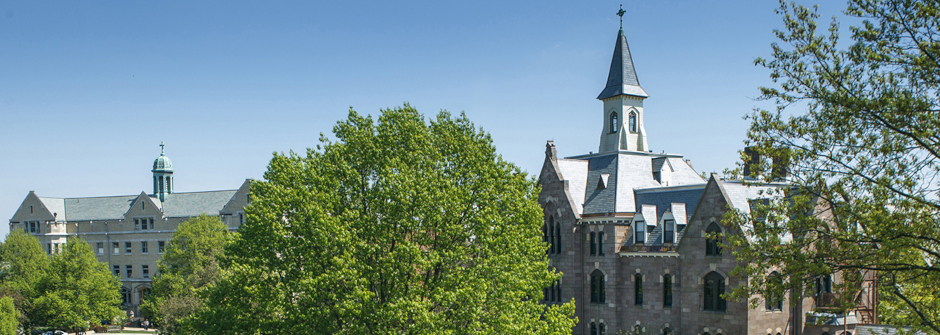
Recycling on the Seton Hall Campuses
Why Recycle?
Recycling conserves natural resources such as timber, water, and minerals. It also curbs carbon dioxide emissions and reduces energy consumption buy reuse. According to the EPA, in 2018, recycling and composting of municipal solid waste (trash) saved over 193 metric tons of carbon dioxide that would have been created from traditional methods of trash disposal outside of recycling programs.
More Facts about Recycling:
- Glass produced through recycling reduces air pollution by 20% and water pollution by 50%.
- Manufacturing disposable bottles requires three times as much energy as manufacturing reusable or recyclable containers.
- Recycling aluminum saves up to 95 of the energy required to produce aluminum from ore.
- The energy saved by recycling one aluminum can operate a television for three hours.
- Recycling 10 plastic bottles saves enough energy to power a laptop for 25 hours.
- Aluminum produced through recycling reduces air pollution by 97%.
- Discarded aluminum cans litter the earth for up to 500 years.
- Discarded plastic litter the earth forever.
For this reason, recycling is mandatory in New Jersey and at Seton Hall University.
Recycling at Seton Hall – South Orange Campus
Seton Hall collects recyclables for removal via the ‘single stream’ process or ‘fully commingled” recycling on the South Orange Campus. This means paper, fiber, plastics (#2 and #5), metals, and cardboard can be disposed of/ collected in one receptacle.
In addition, the university's single-stream collection process composts leaves, branches, and plant material through our contracted collections vendor, South Orange Disposal. It also has bulk collections for scrap oil, metal, cardboard, electronics, batteries, light ballasts, fluorescents, LEDs, and HID light bulbs. Gourmet Dining also recycles cooking oil.
Recycling at Seton Hall – Newark Campus
Seton Hall collects recyclables for removal via the ‘single stream’ process or ‘fully commingled” recycling at the Newark Campus as well. This means paper, fiber, plastics (#2 and #5), metals, and cardboard can be disposed of/ collected in one receptacle.
Newark also has bulk collections for cardboard, electronics, batteries, light ballasts, fluorescents, LEDs, and HID light bulbs.
Recycling at Seton Hall – IHS Campus
Recyclables are removed via the ‘single stream’ process or ‘fully commingled” recycling at the IHS Campus as well. This means paper, fiber, plastics (#2 and #5), metals, and cardboard can be disposed of/ collected in one receptacle. All recyclable items should be placed in the blue marked container and will be collected overnight. Boxes should be left outside their work area, preferably broken down. Small batteries can be placed in containers that are marked for them. For Universal waste, including bulbs, ballasts, and larger batteries, please place a request with Facilities for pickup. For Electronics, please cancel and remove the asset tag and request pickup with Facilities. The item will them be placed in a locked electronic recycling locker.
How can I help?
Recycling starts with every individual on campus. The University has distributed recycling cans throughout the interior and exterior spaces on the South Orange Campus for your use. Please separate your recyclable items from your trash and dispose of them in one marked recycling bin or in a trash can with a clear bag. Remember contaminated or dirty materials with food or other contaminants cannot be recycled (for example - pizza boxes). If your area needs a recycling can, please place a work order with your building manager, and one will be provided once the need is confirmed.
If you have electronic waste for South Orange, please bring it to the lower level of McNulty Hall for disposal or place a work order through your Building Manager for pickup of larger items. If you have electronic waste at the Newark Campus please contact facilities engineering for assistance with disposal.
Responsibilities of Facilities Engineering and GDI (Housekeeping) South Orange Campus :
- Co-mingled recyclable materials are collected in residence halls, office buildings, and classroom buildings. GDI collects them daily in clear bags and brings them outside the building.
- Facilities Engineering (DFE) collects the bags daily and transports them to one of the established recycling containers.
- The major sources, the Bookstore and Gourmet Dining, save cardboard. The user flattens the boxes and ties them in bundles. DFE then picks up these bundles and transports them to the cardboard compactor behind the University Center.
- Facilities Engineering will recycle all leaves, branches, and grass clippings. They will be deposited into an open vegetation box near the rear of the Recreation Center.
- Facilities Engineering will recycle waste oil. The oil will be stored in a 55-gallon drum. When full, an outside firm will haul the drum away, and a new empty drum will be placed.
- Facilities Engineering will recycle all scrap metal by placing it in an open box behind the Recreation Center.
Responsibilities of CBRE and GDI (Housekeeping) Newark Campus:
- Co-mingled recyclable materials are collected throughout the Law School portion of 1 Newark Center. GDI collects them daily in clear bags and brings them to a CBRE-designated location.

